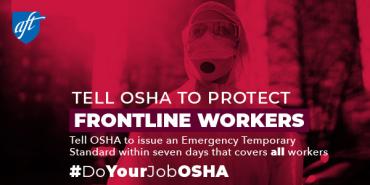Workers Memorial Day, April 28, happened to coincide this year with the day the Occupational Safety and Health Administration first opened its doors nearly 50 years ago. The unfortunate irony is that OSHA, the government agency responsible for protecting workers’ health and safety on the job, is missing in action during the worst pandemic our country has ever faced. Frontline and essential workers are confronting the coronavirus pandemic without adequate protection and training—and it is killing them.
Because there currently is no comprehensive OSHA standard that addresses an employer’s responsibility to protect workers from infectious diseases, workers have no assurance that they will be protected from diseases like COVID-19. OSHA has also failed to enforce the existing standards, such as respiratory protection and other personal protective equipment (PPE) and whistleblower protections.
The AFT and other unions and organizations are demanding that OSHA do its job by implementing an emergency temporary standard to protect healthcare workers, first responders, essential workers and others who are working or returning to work from COVID-19 exposure and infection. In the meantime, OSHA must aggressively enforce existing standards and protect whistleblowers from retaliation.
“This pandemic has exposed every inequality and revealed the lack of regulatory enforcement that could protect the health and safety of the people we serve as well as the people we represent,” said AFT President Randi Weingarten, during a news conference on the subject. “Our members are getting sick and dying,” she said, noting that the deaths of 75 educators, public employees and healthcare workers who have perished from COVID-19 could have been prevented if they had been provided the proper protections. “Our members appreciate the gratitude that people have for frontline workers, but we need an enforceable standard. The Trump administration will not do it, so we have to fight for the standard.”
Part of the AFT’s “Do Your Job OSHA” day of action, included affiliates in 10 states filing more than 40 complaints to OSHA detailing lack of PPE, such as respirators, gloves and gowns, and highlighting OSHA’s refusal to investigate employers who are placing workers at grave risk of infection and death from COVID-19.
Nara Owens, for example, is a nurse at Hillside Rehabilitation Hospital in Warren, Ohio, and a member of the Ohio Nurses Association. She became sick working with patients on a unit that was meant to be non-COVID-19. The hospital did not notify her of her potential exposure or communicate it to the hospital’s health service until two weeks after she was symptomatic. After Owens tested positive, she was told by the hospital’s HR department to file for unemployment.
“We deserve to be safe at work so we can do our job caring for patients, but the hospital failed me, my co-workers and the community,” Owens said. “They should be held accountable, but sadly there is no OSHA standard, nor is there any enforcement. Until that changes, cases like mine will be all too common.”
Legislation has been introduced that would force OSHA to issue an emergency temporary standard within seven days. H.R. 6559—the COVID-19 Every Worker Protection Act of 2020— would also mandate government tracking and investigation of work-related COVID-19 infections, as well as forbid retaliation against nurses and healthcare professionals for reporting infection-control problems or using non-employer-issued PPE when an adequate employer supply is not available.
“OSHA’s mission is to ensure a safe work environment, yet they have not released a standard to protect workers. As states seek to reopen, workers need more than guidance,” said Rep. Rosa DeLauro (D-Conn.), a co-sponsor of H.R. 6559. “We need to be taking the necessary steps to keep workers safe and to make sure employers are providing them with protection from exposure.”
The legislation in Congress, paired with actions taken on April 28 and beyond, is important, said Weingarten. “If we don’t find a way to protect those who are protecting us, who will?”
Sign the petition to support H.R. 6559.
[Adrienne Coles]

